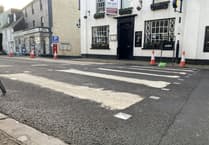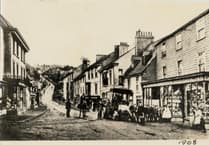A MODBURY resident has died before receiving his Legion d’honneur medal for his part in liberating France in the Second World War.
Ken Matthews, of Silverwell Park, Modbury, was aware that he had been granted the honour but sadly died five days later, a week before the medal arrived. His widow Vera will now wear the medal in his honour at the Service of Remembrance this weekend.
Ken, 93, served as a flight engineer with 419 Moose Squadron during the war, flying Lancaster bombers. He was presented with a Bomber Command Clasp in August 2013. He has now been appointed to the rank of Chevalier in the Ordre national de la Légion d’honneur.
From May to September 1944 he flew with a crew of Canadian airmen on 32 operations across Europe. Despite injuries to crew members on one mission and a fire in the starboard engine on another, they always managed to get home safely.
Ken was born in Rainham, Kent, on August 18, 1924. Despite being adept at maths and well-read, he left school at 14 with no qualifications and went to work for a local electrical firm. Shortly after, he was taken on as an apprentice at Chatham Dockyard, a job at the time, and for a while after, that was highly prized.
When the Second World War started, Ken could have stayed in the dockyard as a reserved occupation, but he volunteered as soon as he was able and joined the RAF in 1942. He was initially trained as a flight mechanic and worked on aircraft maintenance through most of 1943 but was keen to get in the air.
By May 1944, he had completed his flight engineer training and was assigned to an Royal Canadian Air Force squadron, over the next six months he flew 32 missions with his six colleagues in a Lancaster over France, Belgium and Germany.
Ken’s son Tim Matthews said at the celebration of his life that ‘he always counted himself among the lucky ones who did not become part of the high proportion of Bomber Command who never returned.
‘His Lancaster did limp home one night on one engine and with rapidly diminishing fuel supply after being shot up but he always talked about this with characteristic insouciance and modesty. It has been said of Bomber Command that they did not win the war, but that the war could not have been won without them.
‘He would have been the last person to describe his service at heroic, though clearly it was.
‘He subsequently, and throughout my childhood spoke little of his war service, and only in later years would tell tales, often plucking out some as yet unrevealed story about his times. And these would generally focus on the comradeship of those years.’
He met his wife Vera at a dance while on weekend leave in 1944, they were married at Rainham Church on October 11, 1946, meaning he died just two weeks short of their 70th wedding anniversary.
After the war, Ken went back to work at the Dockyards before becoming a clerk in the dispatch office for Blue Circle Cement Company, retiring from there 36 years later as a senior executive.
In 1959, he and his family moved to Devon as he was part of the team setting up the new Plymstock factory. He devoted his spare time to gardening and woodwork and spent Saturday afternoons watching Plymouth Argyle and playing cricket with his son.
Tim said his cousin, Ken’s nephew, ‘summed up my father in words I could not better’ when he said: ‘I thought Ken was one of the finest, kindest and nicest men I met in my life. There was something about his quiet, gentle manner and his seemingly effortless way of making people feel relaxed and at ease in his presence that placed him in a rare category of men.’




